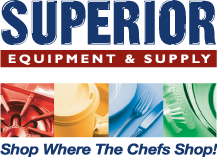
There is a common saying in cooking circles that while cooking is an art, baking is all science. While there are certainly some home cooks and professional chefs alike who are able to simply “eyeball” ingredients for baked goods they’ve made over and over again, there is definitely something to be said for specific techniques and tools, and precise measurements, when it comes to making consistent, high-quality baked goods.
Fortunately, any good restaurant supply store has everything--or at least almost everything--that a cook could want, when it comes to baking; but there are some little-known tricks of the trade that help out as well.
Portion control is fundamental Proper portioning separates great baked goods from the mediocre--and especially the bad. This is a question both of measuring equipment and of technique; the way that one measures sugar is necessarily different from the method of measuring and portioning flour, and both are different from the method needed to correctly portion batters or dough into cooking vessels to get the desired results.
It is absolutely necessary to have different measuring cups for dry and wet ingredients, in no small part because liquids quite simply behave differently from even finely-milled solids. Improperly-measured or -portioned ingredients can contribute to a batter that is not dense enough or too dense, or one that doesn’t have enough leavening, or one that is tough rather than tender. In addition, inconsistent portioning of dough or batter can lead to uneven cooking. Make sure that your measuring implements are precise, consistent, and easy to read and use, and your baked goods will come out better.
Use and store ingredients properly One of the biggest pitfalls that would-be bakers make is in not understanding the proper use and storage of key ingredients. While most of what goes into a baked good is, indeed, shelf-stable, not paying adequate attention to use-by dates and other important pieces of information leads to disappointing results every time. Baking soda and baking powder both lose their potency after a period of time, which can result in needing more to get the same effect--which throws off the balance of the finished product--or in under-leavened items. Yeast, as well, has an expiration date; after which point no amount of proofing will result in a satisfying loaf.
Proper storage is also an important factor, both of dry goods and perishable items: flour and other dry goods should be kept away from heat, light, water, and--as much as possible--air, to maintain the best qualities and keep them from degrading. This is especially true of ingredients that have unsaturated fats in them, such as whole wheat flour; the unsaturated fats can oxidize easily, leading to rancid flavors. Proper storage and attention to expiration dates makes for quality baked products that any chef would be proud to take credit for.
Assemble your ingredients the right way for the best texture and taste While it may seem like the easiest part of making baked goods, the way that you go about mixing and assembling the ingredients to make your batter or dough plays a major role in how the end product will come out. Over mixing of batters results in much tougher baked goods, and under mixing can end up yielding mushy, underdeveloped flavors and textures. Batters and doughs that use chemical leaveners should be brought together as quickly and loosely as possible, while breads that use yeast require much harder working to get the most out of the development of gluten--the protein found in wheat and some other grains that allows it to remain elastic.
The best baked goods come together from a combination of attention to the correct factors and the proper equipment. Technique--whether it’s properly measuring and portioning, mixing the correct amount of time, or shaping items the right way--along with tools is the defining factor when it comes to great baked goods, whether they’re bread, cake, pie, cookies, or more. Fortunately, while technique can take some time to develop, the tools of the trade are always available at any respectable restaurant supply store. With some practice and attention to details, you can make delightful baked goods that come out perfectly every time.
